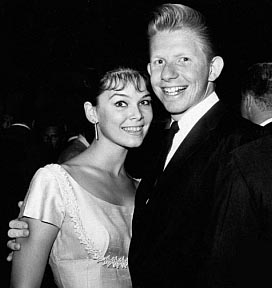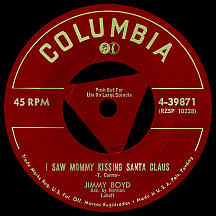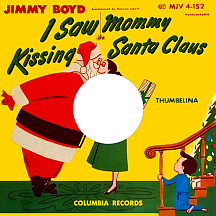JIMMY BOYD
I Saw Mommy Kissing Santa Claus
One of our most beloved Christmas songs started as a scandalous affront to the sacred holiday. In 1952, officials of the Catholic church were taken aback at the notion of merging Christ's birth with supposed hanky-panky between a married housewife and Ol' Saint Nick, as seen through the eyes of a child, in the multi-million-selling "I Saw Mommy Kissing Santa Claus." Today the song is enjoyed by children and adults the world over, sung by individuals and large groups at schools, parties and sometimes even church events. Few are shocked by the subject matter revealed in song by 13-year-old Jimmy Boyd; many, in fact, find humor in what might have actually happened '...if daddy had only seen...' the scene going on between wifey dear and the liberty-taking bearded gent.
Songwriter Tommie Connor hailed from London and successfully plied his craft during the 1930s, '40s and '50s; though the majority of his compositions weren't seasonal, his Christmas songs were quite successful. In 1937 he penned "The Little Boy That Santa Claus Forgot" with Michael Carr and Jimmy Leach, made popular by singer Vera Lynn and, later, Nat "King" Cole. The timing turned out to be perfect for young Jimmy Boyd with another of Connor's Christmas tunes. Born in 1939 in McComb, a rural town in southern Mississippi, Jimmy grew up in a musical environment; his family moved to the Los Angeles area and by the age of seven he was playing guitar and singing, not shy about doing so publicly whenever the opportunity presented itself. After an appearance on a TV talent show on "Lucky 13" KLAC, he was invited to New York to make a guest appearance on CBS-TV's Frank Sinatra Show, which sparked the interest of Mitch Miller of Columbia Records.
Jimmy's first single, in early 1952, was "(The Angels Are Lighting) God's Little Candles," the freckle-faced 13-year-old's high-pitched vocal delivery making him sound half his real age; with "There's a Little Train A-Chuggin' in My Heart" it became obvious the target audience was young children and their record-buying parents. By the time "I Saw Mommy Kissing Santa Claus" hit the airwaves around Thanksgiving, young Boyd's voice was starting to change, the awkward in-between tonsil sound permanently archived in the grooves of one of the decade's top-selling records, a number one hit during the weeks of Christmas and the New Year. At that point Jimmy's musical path was set, whether he liked it or not; childish novelty songs became his bread and butter. Many were tied to various holidays, sentimental tunes like "My Bunny And My Sister Sue" and "Jimmy Roll Me Gentle (On Easter Day)" among the singles issued as regular releases and in children's series editions with cartoonish picture sleeves.
The record company began teaming him with its other singing stars. A spring 1953 duet with Frankie Laine, "Tell Me a Story" (penned by Terry Gilkyson), provided another top ten hit (rescuing Jimmy from future "one-hit wonder" lists); Laine played the dad to Boyd's obnoxious little boy and fans loved it. He joined Rosemary Clooney for "Dennis the Menace," based on Hal Ketcham's popular newspaper comic strip that had debuted two years earlier; the mind's-eye image created by the song ('There is bound to be a calamity no matter where he goes...') anticipated the TV comedy series starring Jay North that ran on CBS from 1959 to 1963. Jimmy Boyd had already launched his own acting career in the summer of '52 with a small part in an episode of ABC's sci-fi series Space Patrol; more assignments in television and movies were to follow as attempts at sustaining his singing career eventually declined.
Yuletide round two: "Santa Got Stuck in the Chimney," a no-hit bit of 1953 gimmickry (and a Christmas Eve scenario too often used over the years), its distinctly non-flirtatious theme (no ticklin' from mom this year!) perhaps the reason sales were marginal. Jimmy's 15th birthday rolled around and his songs became slightly more age appropriate. Big band era songwriter Sid Robin's "(I've Got Those "Wake Up, Seven-Thirty - Wash Your Ears, They're Dirty - Eat Your Eggs and Oatmeal - Rush to School") Blues," besides having one of the longest titles ever, was delivered like a real blues song. His first feature film, horse story Racing Blood, hit theaters in the spring of 1954, around the time Columbia paired him with eleven-year-old female soundalike Gayla Peevey (who'd debuted with "I Want a Hippopotamus for Christmas" during the previous holiday season); their collaboration, "Kitty in the Basket," was predictably underwhelming. Jimmy's duet projects came to an end.
Christmas 1954: Jimmy hitched his hooved helpers to the hot dance trend of the moment with "I Saw Mommy Do the Mambo (With You Know Who)," a desperate attempt to reprise his two-year-old smash. Record buyers weren't tricked. In 1955, the nearly 17-year-old Boyd, still sounding half his age (on purpose?), recorded "Reindeer Rock," unwittingly peddling fake rock and roll as only Columbia knew how. On the video side, he was well-suited to the role of Mark Twain's Huckleberry Finn in a late-'56 U.S. Steel Hour presentation of Tom Sawyer; "Rockin' Down the Mississippi," a country-leaning single, was unrelated to the dramatic program. He played the character again a year later on a U.S. Steel Hour sequel, The Adventures of Huckleberry Finn. Another country single, "I Wanna Go Steady," marked the end of his contract with Columbia.

A familiar face in film and television the next few years, he was a regular on Bachelor Father, John Forsythe's star-making sitcom that moved from CBS to NBC to ABC during its five-year run starting in 1957; Jimmy played Noreen Corcoran's goofy boyfriend Howard. His movies during this time include Inherit the Wind starring Spencer Tracy and the Bing Crosby musical High Time, where he met costar and soon-to-be '60s "it" girl Yvonne Craig. The two were married soon afterwards, a stroke of good fortune for man-boy Boyd. He kept busy making records, too, with one-off singles for Jubilee, Dot and Capitol. Drafted into the Army in 1961, his marriage was over by the time he was discharged, after which he returned to the sound stages and recording studios. ABC-TV's naval sitcom Broadside, starring Kathleen Nolan, kept Jimmy busy for most of 1964 and '65. Around the same time, Terry Melcher helmed a couple of well-produced, mature-sounding singles on Vee-Jay that bear absolutely no resemblance to Jimmy's 1950s output; one song, "That's What I'll Give to You," was written by Barry Gibb, who was living in Australia at the time, still a couple of years away from achieving international success with his Bee Gees brothers.
Once again giving his music career the old college try, Jimmy recorded at Imperial Records in 1966 under producers Snuff Garrett and Leon Russell. He suddenly had his high-pitched, youthful voice back in what was, perhaps, an attempt to take a Gary Lewis-type approach to selling records, but it didn't work. In the long run he was better served by his acting career; he even appeared in an October 1967 episode of Batman alongside ex-wife Yvonne, the bat-cycle-riding Gotham City crime-fighter known as Batgirl (arguably her most famous role). A number of movie roles followed, his last coming in 1983 when he was billed as Jim Boyd in the sci-fi thriller Brainstorm (it was also Natalie Wood's final film, tragically so in her case). Retirement, from show business at least, came at age 44 for the singer and actor who'll always be best remembered as that overly curious preschooler in a 13-year-old body, scarred for life when he spotted his mother locking lips with the jolly dude in red who dropped off presents every year and, as we can only assume, occasionally endured a punch in the nose from furious fathers around the globe.



